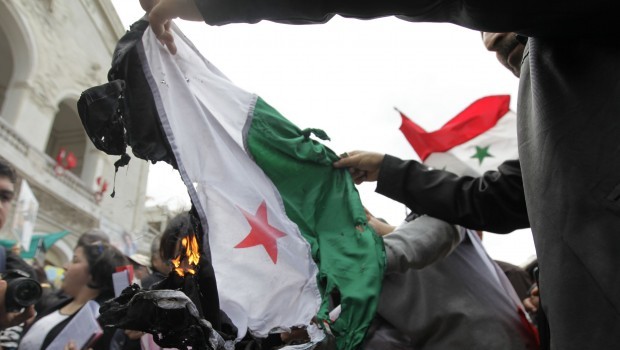The massacres and sieges that are taking place in the western suburbs of Homs and the villages surrounding Qusayr are the result of attacks by several Lebanese and Syrian forces.
Organized attacks, launched by regime forces, using warplanes to strafe and bombard these areas. Hezbollah, militias aligned with the Syrian Nationalist Party, and local gangs that support the regime on a sectarian level have also participated in these attacks.
What is the reason for such violent mobilization in rural areas—mostly villages and farms? President Bashar Al-Assad explained to a Lebanese delegation that visited him a few days ago that his strategy for the current phase of fighting is focused on cleansing Homs and the surrounding countryside.
The westward trend is indicative of how the war in Syria is developing. The rebels have seized control of several areas in southern and eastern Syria, and the fight for Syria is now taking place in Damascus. Assad will be preparing to flee to loyal areas, such as the Mediterranean coast and Homs, should the capital fall into rebel hands. Another possibility is that he will retain control over roughly one-third of the country. This would consist of Damascus, Homs and the Mediterranean coast. Therefore, his troops are fighting to secure the route between Damascus and Homs, since from there they can gain and control access between Lattakia, Baniyas, Al-Qaradha, Tartus and the aforementioned cities.
The term “cleansing” that Assad chose to use has a disturbing meaning that infers the elimination of unwanted groups. It implies that the regime could be preparing to commit new massacres, involving premeditated murder and razing towns in order to terrorize citizens and force them to leave—as the Serbs did in the 1990s in Bosnia and Herzegovina.
By evacuating hundreds of thousands of unwanted residents from towns and cities, Assad would have “cleansed” the land. He could then declare his new republic, which he considers capable of combining Alawite, Christian, Druze and Shi’ite minorities, in addition to Sunni groups that are affiliated with the regime.
Theoretically, all that is required for Assad to create a new republic is to burn the land and cleanse it of its inhabitants. Then they can be replaced by “eligible” citizens from Damascus, along with the remaining cities that will later be lost. Practically, however, his republic is implementing a strategy that will allow for a longer war and larger massacres.
The dictator’s dream is to hold on to power—even until he rules over only a little village at the top of a mountain. It is for this reason that he wants to break up Syria and establish his own separate state. Does it make sense that his chosen citizens should genuinely accept being ruled over by an abusive, immoral and evil regime?
It is too early to say what will come after the current war. What is most important now is protecting the people’s lives and preventing massacres. Such events were previously unknown outside of Cambodia, however, unlike today, the world did not see or hear the events that were taking place.
The world has not yet heard of the Qusayr’s distress. This will grant Assad and his military leadership the confidence they need to “cleanse” from Homs to the coast. It will also allow Hezbollah militias—and most likely armed Iraqi and Iranian groups that have been fighting with Assad’s forces since last year—to continue fighting alongside Assad’s forces, as they have done for the last year.
All we can do is imagine the gravity of the upcoming tragedy for millions of Syrians in these areas, whether they are being intentionally targeted with planned massacres or forced to evacuate their homes. The international community, including Syria’s neighbors, will be unable to adequately respond to the horror and magnitude of the attacks, and likewise to the sheer numbers of those fleeing from them.
We call on Arab governments and international organizations to put an end to this massacre in Qusayr. We insist on deterring this criminal regime through support for the opposition and the Syrian people; we are determined to reduce Assad’s air and ground forces, including his heavy weaponry. The genocide in Syria, which puts numerous forces against unarmed civilians, has adopted a frank and systematic approach. Armed opposition groups do not have the means to defend their areas or the populations therein. The regime only dares to commit further massacres because it has seen that no one has even attempted to stop it. So far, all condemnations were only made by humanitarian organizations with nothing more than a conscience with which to voice rejection.
